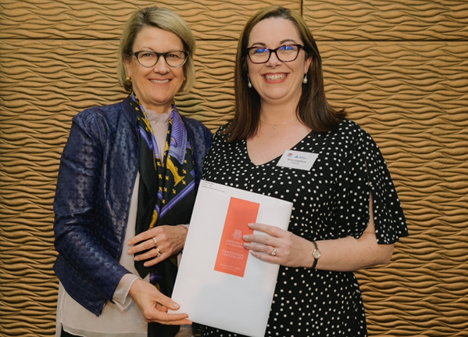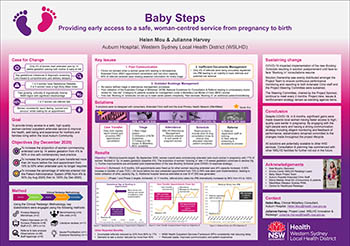Discover how some award-winning and nationally recognised local redesign projects are making sustainable improvements to health services and patient outcomes, supported by the Agency for Clinical Innovation’s Centre for Healthcare Redesign.
Rose Lougheed, A/Director of Clinical and Corporate Governance at the Justice Health and Forensic Mental Health Network, is a self-confessed redesign enthusiast. Rose’s first re-design project in 2017 involved a review of general practice (GP) services for the network.
"Completing the project through the Centre for Healthcare Redesign (CHR) was fun and formative. I saw ideas become reality, gained knowledge and experience and put it to good use to completely redesign our GP service,” reflects Rose.
“I adopted the redesign methodology as a way to approach my work. I found it could be applied to almost anything. My leadership, communication and engagement skills were enhanced, and my focus shifted in such a positive way.”

Rose Lougheed (right) receives her graduation certificate from former NSW Health Secretary, Elizabeth Koff.
Since receiving her Graduate Certificate in Clinical Redesign for that first project, Rose has been the first student of the Agency for Clinical Innovation’s Centre for Healthcare Redesign to complete a Master of Healthcare Redesign, through the Professional Practice Pathway at the University of Tasmania. She has also started her PhD studies focusing on healthcare redesign and health leadership.
Redesign has presented me with so many opportunities I would not otherwise have had. I encourage my teams to be trained in the redesign methodology and approach, which has led to significant improvements for our services and patients.
“Having the methodology and approach behind our practices makes complex projects more straightforward. Thanks to the Graduate Certificate in Clinical Redesign, my team’s language has aligned, our projects have grown in scope, and we’ve enjoyed a lot of success, including a Premier’s Award nomination.”
The network’s Creating Healthy Tomorrows project demonstrates the impact a local redesign project can have at a statewide level.
“The 2021 project promotes an integrated care experience for patients in custody,” explains Rose. “It has formed the foundation of the Justice Health and Forensic Mental Health Network’s new strategic plan, model of care and visual identity. This will be the basis for the network’s focus and care delivery for the next ten years.”
The role of redesign in closing the gap
During the pandemic, the Centre for Healthcare Redesign program adapted to deliver the course virtually. This ensured continuity, responsiveness and agility for course participants and local teams.
The first program to be completely adapted for online delivery was also the second dedicated Aboriginal healthcare redesign cohort to go through the Graduate Certificate program. “This cohort displayed resilience, determination and humour in the face of the unprecedented challenges presented by the pandemic,” says Tricia Cummins, Associate Director of Clinical Innovation, Redesign and Consumer Engagement at the Agency for Clinical Innovation.
“The program helps you think differently to implement change projects,” says Kelly Drury, Service Manager for Birra-li Aboriginal Maternal and Child Health Service, Hunter New England Local Health District. “It provides a robust framework for intelligence gathering and analysis for accountable decision making.”
Kelly is working on the Niiarrnuba Burraidjaa, Niiarrnuba Guumba – Our Children, Our Tomorrow project. It aims to change how the Universal Health Home Visit Service is provided to Aboriginal families living in the Awabakal and Worimi communities of Port Stephens, Newcastle and Lake Macquarie.
“It was great to participate in the program with a cohort of Aboriginal and non-Aboriginal health professionals collaborating to improve health outcomes for Aboriginal communities,” explains Kelly, who will also sponsor a project in the next cohort in July.
I look forward to supporting a project team of Aboriginal health staff to enhance their skills to implement innovative practice interventions for Aboriginal patients.
An Aboriginal health project at St Vincent’s Hospital in Sydney, Stay'n Deadly and Stay'n In, has reduced the number of incomplete treatment rates for Aboriginal patients in the emergency department. The project's sustained impact supports better health outcomes for Aboriginal people and has been recognised with a NSW Health Award.
The project reduced the incomplete treatment rate from 28% in January 2020, to a cumulative average of 6% in 2021.
“One of the biggest successes we’ve had is sustaining the gains since we implemented the project; which has gained a wide interest among executives and clinicians across Australia who may adapt and adopt the practice,” says Viji Joseph Mathews, the project's local redesign leader.
National recognition
A redesign project team from Auburn Hospital has been recognised at a national level for its 2021 project, Taking ‘Baby Steps’ towards starting pregnancy care sooner.
The project improves access to specialised antenatal care and increases the number of women starting this care earlier in pregnancy. It was highly commended at the Australian Council on Healthcare Standards’ Annual Quality Improvement Awards 2021, in the Clinical Excellence and Patient Safety category.
Click to enlarge the Taking ‘Baby Steps’ towards starting pregnancy care sooner project poster.
“The greatest achievement for us has been seeing the changes implemented, sustained and transitioned into our business-as-usual processes,” says Julianne Harvey, Project Lead, Innovation and Redesign at Western Sydney Local Health District.
“We’ve seen more than 35% of local women start pregnancy care before 14 weeks gestation. This is an amazing increase from a baseline of 4%.”
